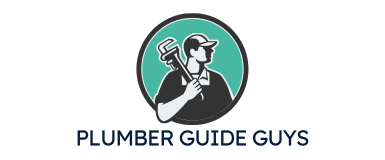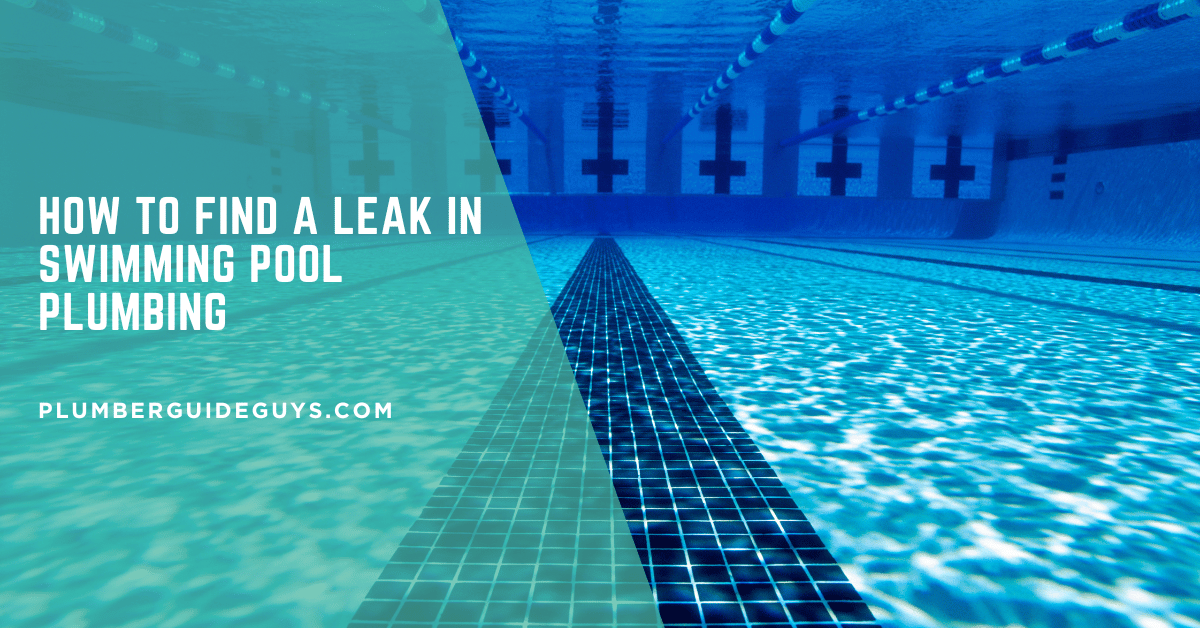Affiliate Disclosure
Plumber Guide Guys is a participant in the Amazon Services LLC Associates Program, an affiliate advertising program designed to provide a means for sites to earn advertising fees by advertising and linking to Amazon.
How to Find a Leak in Swimming Pool Plumbing? Is your swimming pool quietly losing money and water? Finding a leak in your pool’s plumbing can save you thousands. It’s a skill every pool owner needs to protect their investment and avoid long-term damage.
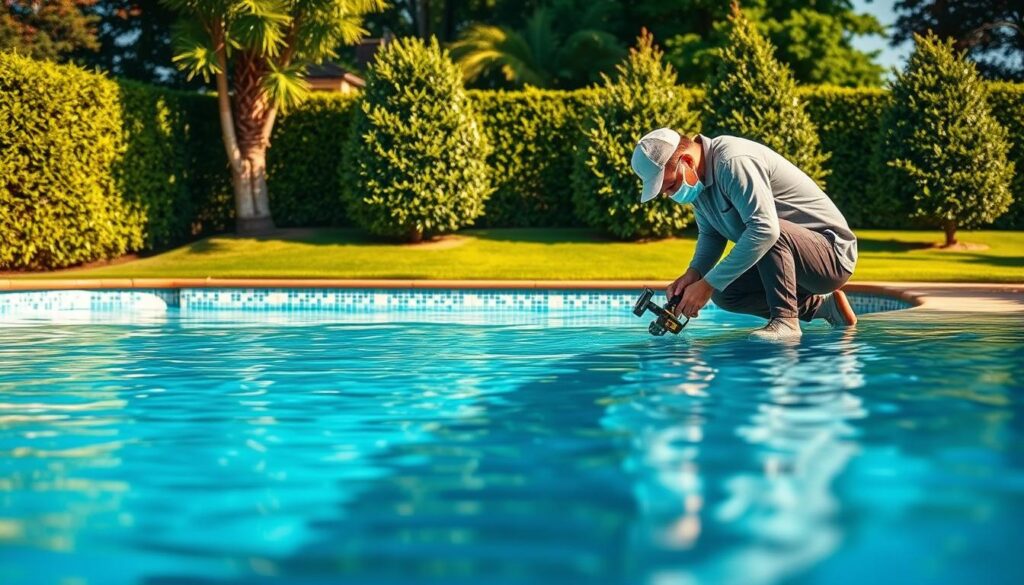
Pool leaks can happen in many places, from the liner to underground pipes. To find a leak, you need a step-by-step approach and careful watching. If you don’t find leaks, they can waste water, raise your bills, and harm your pool’s structure.
Experts say to check your pool often and use leak detection methods. Learning how to spot problems early can save you from big repair costs.
Key Takeaways
- Pool leaks can occur in multiple hidden locations
- Early detection prevents expensive structural damage
- Professional and DIY leak detection methods exist
- Regular pool maintenance helps prevent leaks
- Water chemistry plays a critical role in pool health
Table of Contents
Understanding Common Causes of Pool Leaks
Pool leaks can be frustrating and costly for homeowners. It’s important to find the root cause of inground pool leaks to prevent water loss and damage. Several key factors contribute to pool plumbing leak repair needs.
Pools are complex systems that can be damaged in many ways. Knowing these issues can help you catch and fix problems early, avoiding major repairs.
Structural Issues and Cracks
Structural problems are a main cause of pool leaks. These can come from:
- Ground settling and shifting
- Age-related concrete deterioration
- Improper initial installation
- Extreme temperature changes
Small cracks can quickly turn into big repair challenges. Hairline fractures often expand with time, creating more extensive damage.
Equipment and Plumbing Problems
Pool equipment can also be a source of leaks. Common issues include:
- Worn-out pipe connections
- Damaged pump seals
- Corroded valves
- Loose fitting components
Regularly checking your pool’s mechanical systems is key to finding leaks.
Environmental Factors
External conditions can also affect your pool’s structure:
- Soil erosion around pool foundations
- Seasonal ground movements
- Tree root interference
- Extreme weather conditions
Knowing these causes helps pool owners take steps to keep their pool in good shape and avoid expensive repairs.
Signs Your Pool Has a Leak
Finding a leak in your pool early can save you a lot of money and time. If you see certain signs, it might mean your pool has a leak.
Signs of a leak in your vinyl liner pool can be hard to spot. Look out for these important signs:
- Unexplained water level drops beyond normal evaporation
- Wet or soft ground surrounding your pool area
- Visible cracks in the pool liner or structure
- Increased water bill without apparent reason
Changes in your pool’s water chemistry can also hint at leaks. Unusual algae growth or consistently unbalanced pH levels might mean water is leaking.
Some signs are less obvious but just as important:
- Persistent damp areas near pool equipment
- Unexplained chlorine consumption
- Structural shifts or settling around the pool deck
Spotting these signs early can help fix the problem before it gets expensive. If you see many signs, getting a professional to check might be a good idea.
How to Find a Leak in Swimming Pool Plumbing
Finding leaks in your pool plumbing saves time, money, and prevents damage. Both pros and DIY fans use several methods to spot leaks. Knowing these methods helps you fix water loss issues fast.
Exploring different ways to find leaks is key. Each method gives clues about water loss.
The Bucket Test Method
The bucket test is simple yet effective. It tells if your pool leaks or just loses water to evaporation. Here’s how to do it:
- Fill a bucket with pool water to about one inch from the top
- Place the bucket on a pool step or on a stable surface within the pool
- Mark the water level inside and outside the bucket
- Wait 24-48 hours and compare the water loss
Dye Testing Technique
A dye test can show where leaks are. It’s best for finding leaks near pool fixtures and surfaces:
- Turn off pool pumps and let the water settle
- Squeeze pool leak detection dye near suspected leak areas
- Watch if the dye goes into cracks or leak points
- Look closely at skimmers, return lines, and pool walls
Pressure Testing Process
Pressure testing is a detailed way to find hidden leaks. Pool pros use special tools for this:
| Testing Stage | Process Details |
|---|---|
| Preparation | Isolate specific plumbing lines |
| Pressurization | Apply controlled air pressure to lines |
| Monitoring | Check for pressure drops indicating leaks |
“Catching pool leaks early can prevent significant structural damage and save hundreds of dollars in repair costs.”
While these methods help find leaks, some issues need a pro’s help.
Essential Tools for Pool Leak Detection
For underwater pool leak detection, the right tools are key. They help find pool pipe leaks fast and right. Both pros and DIY folks need certain gear to spot water loss issues well.
Your pool leak detection kit should have a few important items. These help you find and spot water problems:
- Leak finder dye for precise underwater testing
- Waterproof goggles for visual underwater inspections
- Pressure testing equipment to check plumbing systems
- Digital moisture meters
- Electronic leak detectors
For advanced underwater leak detection, you need special gear. Professional leak detection services use high-tech devices. These can find even tiny leaks in complex pool systems.
| Tool | Purpose | Skill Level |
|---|---|---|
| Leak Finder Dye | Identifying precise leak locations | Beginner |
| Pressure Gauge | Testing plumbing system integrity | Intermediate |
| Electronic Leak Detector | Locating underground pipe leaks | Advanced |
Good leak detection tools save time and money. They help find issues early. Some tools need practice to use well.
Checking Pool Equipment and Connections
Swimming pool leak detection needs a detailed look at your pool’s equipment and connections. Finding problems early can save you money and prevent water loss.
Your pool’s equipment and connections are key to leaks. Knowing how to check these parts helps keep your pool in good shape and saves water.
Inspecting Pump and Filter Systems
Start with your pump and filter systems for leak detection. Watch out for these signs:
- Visible water puddles around equipment
- Unusual noises from the pump
- Decreased water pressure
- Continuous running of pump or filter
Examining Skimmer and Return Lines
Skimmer and return lines often have leaks. Look for:
- Cracks in the skimmer body
- Loose fittings around return jets
- Signs of water seepage near connection points
- Visible pipe damage or corrosion
Evaluating Valve and Fitting Connections
Valve and fitting connections can have small leaks. Carefully inspect all connection points for any signs of moisture or deterioration. Use a flashlight for hard-to-see areas.
Pro Tip: If you’re unsure about a leak, try dye testing or get a professional pool maintenance expert.
Regular checks of your pool’s equipment and connections are key. They help keep your pool healthy and efficient. By being proactive, you can fix small leaks before they become big problems.
Underground Plumbing Leak Detection Methods
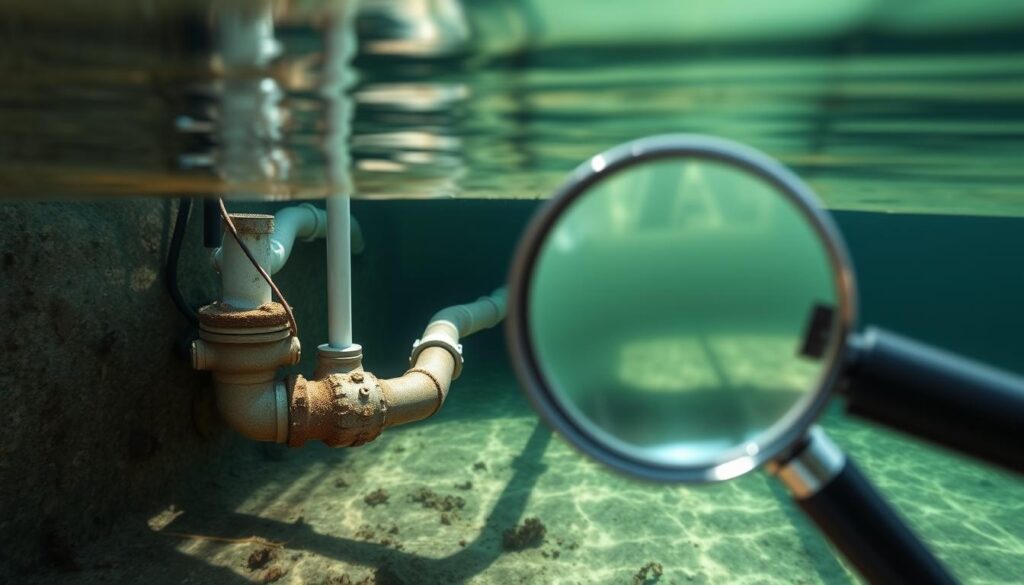
Finding leaks in underground pool pipes is tough for homeowners. Inground pool leak detection needs special techniques. Experts use advanced methods to find hidden leaks in your pool’s underground pipes.
There are several ways to find underground pool pipe leaks:
- Electronic Leak Detection
- Acoustic Listening Devices
- Soil Moisture Mapping
- Pressure Testing
Electronic leak detection uses special equipment to find leaks. It sends electrical signals through the pipes. This way, experts can find leaks without digging up your yard. It’s a safe and effective way to find leaks.
| Detection Method | Accuracy | Invasiveness |
|---|---|---|
| Electronic Tracking | High | Low |
| Acoustic Listening | Medium | Medium |
| Soil Moisture Analysis | Low | High |
If you think you have underground pipe leaks, get help from a pro. DIY methods often can’t find complex underground leaks. Experts have the right tools and know-how to find and fix leaks.
“Underground leak detection requires precision and professional tools that go beyond standard homeowner capabilities.” – Pool Maintenance Expert
Pool owners should look out for signs like water loss, soft ground, or higher water bills. These signs mean you might have underground leaks that need a pro to check.
DIY Pool Leak Repair Solutions
Finding a leak in your pool can be upsetting. But, many leaks can be fixed with basic skills and the right steps. Whether it’s a vinyl liner leak or other damage, knowing how to repair it can save you money and time.
Before you start fixing, it’s key to find out where the leak is and if you can do it yourself.
Patching Vinyl Liners
Vinyl liner leaks are usually simple to fix. You’ll need a few tools:
- Underwater vinyl patch kit
- Clean cloth
- Scissors
- Measuring tape
To patch a vinyl liner, follow these steps:
- Clean the damaged area well
- Cut a patch a bit bigger than the hole
- Apply the patch underwater, pressing hard
- Make sure there are no air bubbles
Fixing Plaster and Concrete Cracks
Fixing small cracks in concrete pools needs care. Pool plumbing leak repair in concrete often uses special epoxy or hydraulic cement. Small cracks can usually be fixed without a pro.
“A stitch in time saves nine” – This saying is true for pool leak repairs!
Repairing Equipment Connections
Loose or damaged equipment connections can cause big leaks. Check pump fittings, valves, and seals well. Tightening or replacing worn-out gaskets can fix small leaks.
While DIY fixes work well, big or complex leaks need a pro pool tech to avoid more damage.
Professional Pool Leak Detection Services
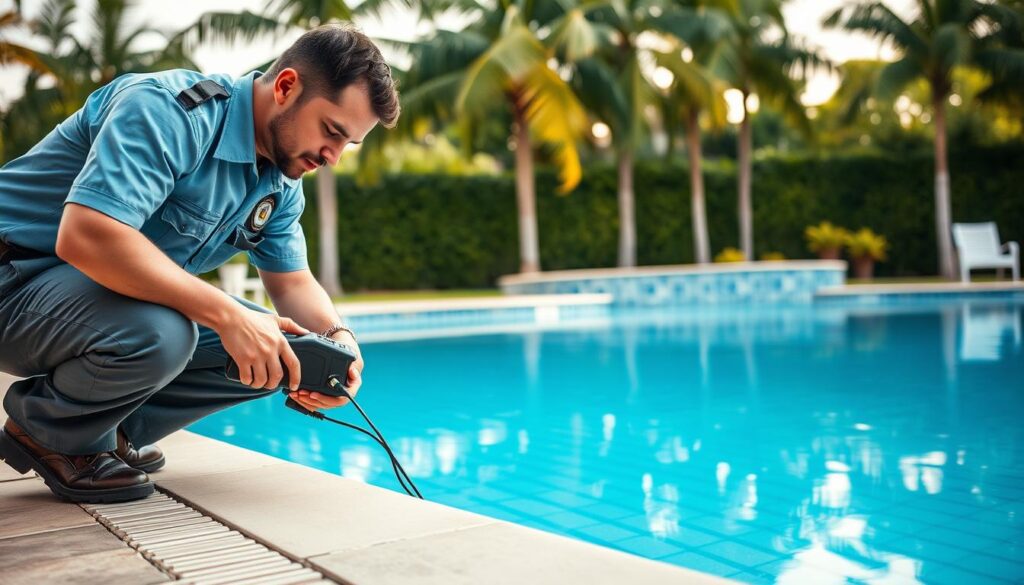
When dealing with complex swimming pool leaks, professional help is key. Inground pool leaks need special skills that DIY methods can’t match. Experts can spot and fix tough leaks that might be hard to see.
Choosing the right service for pool leak detection is important. Look for:
- Certified technicians with the right tools
- A history of solving pool leak problems
- Latest leak detection tech
- Full inspection and repair services
Professional detection uses advanced methods like:
- Acoustic listening devices
- Thermal imaging cameras
- Pressure testing tools
- Electronic leak tracing systems
The cost for professional inground pool leak detection is $300 to $1,000. It might seem pricey, but it can prevent costly damage and water loss.
Pro tip: Always ask for a detailed written estimate and check if they offer a warranty before hiring a pool leak detection service.
Professional expertise can turn a big repair into a simple maintenance task.
Preventing Future Pool Leaks
To keep your swimming pool safe from water loss and costly repairs, act early. Regular maintenance can make your pool last longer and save you money.
Pool owners can stop water loss by using smart, ongoing strategies. These strategies tackle many possible problems.
Regular Maintenance Practices
Regular upkeep helps spot issues early. Your to-do list should include:
- Weekly checks of the pool’s surface
- Monthly checks on equipment
- Quarterly plumbing checks
- Annual checks by a pro
Water Chemistry Management
Keeping water chemistry balanced is key to avoiding repairs. Bad chemistry can harm your equipment and pool structure.
| Chemical Parameter | Ideal Range | Potential Risk if Unbalanced |
|---|---|---|
| pH Level | 7.2 – 7.8 | Equipment corrosion |
| Alkalinity | 80 – 120 ppm | Surface damage |
| Chlorine | 1 – 3 ppm | Potential pipe deterioration |
Winterization Practices
Right winter prep stops water loss in cold months. Drain water, protect equipment, and use winter covers to avoid damage.
“Prevention is always more cost-effective than repair” – Pool Maintenance Experts
By sticking to these tips, you can lower the chance of pool leaks. This keeps your pool healthy and working well.
Conclusion
Swimming pool leak detection is very important for pool owners. It helps save money and prevents damage to your pool. Regular checks and maintenance are key to avoiding expensive fixes.
You now know how to find and fix leaks in your pool. From simple tests to professional checks, you have the tools to handle leaks early. This stops small problems from becoming big ones.
Early detection is essential. Small leaks can turn into big, costly issues if not caught soon. By staying on top of maintenance and leak prevention, you protect your investment. This keeps your pool water clean and fun for years.
Knowledge and attention are your best tools for pool care. By using the tips from this guide, you can keep your pool in top shape. This saves money and lets you enjoy swimming without worries.
